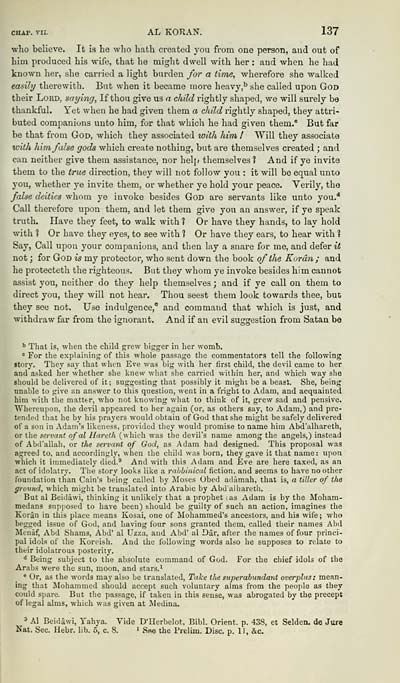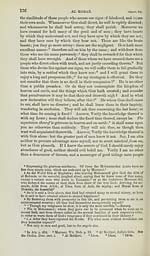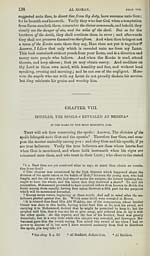Download files
Complete book:
Individual page:
Thumbnail gallery: Grid view | List view

CHAF. vn. AL KORAN. 137
who believe. It is he who hath created you from one person, and out of
him produced his wife, that he might dwell with her : and when he had
known her, she carried a light burden for a time, wherefore she walked
easily therewith. But when it became more heavy,*' she called upon God
their Lord, saying, If thou give us a child rightly shaped, we will surely be
thankful. Yet when he had given them a child rightly shaped, they attri-
buted companions unto him, for that whicli he had given them." But far
be that from God, which they associated witli him I "Will they associate
with him false gods which create nothing, but are themselves created ; and
can neither give them assistance, nor helj» themselves? And if ye invite
them to the true direction, they will not follow you : it will be equal unto
you, whether ye invite them, or whether ye hold your peace. Verily, the
false deities whom ye invoke besides GoD are servants like unto you."*
Call therefore upon them, and let them give you an answer, if ye speak
truth. Have they feet, to walk with ? Or have they hands, to lay hold
with ? Or have they eyes, to see with 1 Or have they ears, to hear with 1
Say, Call upon your companions, and then lay a snare for me, and defer it
not ; for God is my protector, who sent down the book of the Koran ; and
he protecteth the righteous. But they whom ye invoke besides him cannot
assist you, neither do they help themselves ; and if ye call on them to
direct you, they will not hear. Thou seest them look towards thee, but
they see not. Use indulgence,® and command that which is just, and
withdraw far from the ignorant. And if an evil suggestion from Satan be
i" That is, when the child grew bigger in her womb.
"= For the explaining of this whole passage the commentators tell the following
story. They say that when Eve was big with lier first child, the devil came to her
and asked her whether she knew what she carried within her, and which way she
should be delivered of it; suggesting that possibly it might be a beast. She, being
unable to give an answer to this question, went in a fright to Adam, and acquainted
him with the matter, who not knowing what to think of it, grew sad and pensive.
"Whereupon, the devil appeared to her again (or, as others say, to Adam,) and pre-
tended tiiat he by his prayers would obtain of God that she might be safely delivered
of a son in Adam's likeness, provided they would promise to name him Abd'alhareth,
or the servant of al Uareth (which was the devil's name among the angels,) instead
of Abd'allah, or the servant of God, as Adam had designed. This proposal was
agreed to, and accordingly, when the child was born, they gave it that name: upon
which it immediately died.' And with this Adam and Eve are here taxed, as an
act of idolatry. The story looks like a rabbinical fiction, and seems to have no other
foundation than Cain's being called by Moses Obed adiimah, that is, a tiller of the
ground, which might be translated into Arabic by Abd'alhareth.
But al Beidawi, thinking it unlikely that a prophet (as Adam is by the Moham-
medans supposed to have been) should be guilty of such an action, imagines the
Koran in this place means Kosai, one of Mohammed's ancestors, and his wife; who
begged issue of God, and having four sons granted them, called their names Abd
Menaf, Abd Shams, Abd' al Uzza, and Abd' al Dar, after the names of four princi-
pal idols of the Koreish. And the following words also he supposes to relate to
their idolatrous posterity.
^ Being subject to the absolute command of God. For the chief idols of the
Arabs were the sun, moon, and stars.^
« Ur, as the words may also be translated, Take the superabundant overplus: mean-
ing that Mohammed should accept such voluntary alms from the people as they
could spare. But the passage, if taken in this sense, was abrogated by the precept
of legal alms, which was given at Medina.
438, et Seldcn. de Jure
=* Al Beidawi, Yahya. Vide D'Herbelot, Bibl. Orient, p.
Nat. Sec. Hebr. lib. 5, c. 8. ' Sne the Frelim. Disc. p. 11,
who believe. It is he who hath created you from one person, and out of
him produced his wife, that he might dwell with her : and when he had
known her, she carried a light burden for a time, wherefore she walked
easily therewith. But when it became more heavy,*' she called upon God
their Lord, saying, If thou give us a child rightly shaped, we will surely be
thankful. Yet when he had given them a child rightly shaped, they attri-
buted companions unto him, for that whicli he had given them." But far
be that from God, which they associated witli him I "Will they associate
with him false gods which create nothing, but are themselves created ; and
can neither give them assistance, nor helj» themselves? And if ye invite
them to the true direction, they will not follow you : it will be equal unto
you, whether ye invite them, or whether ye hold your peace. Verily, the
false deities whom ye invoke besides GoD are servants like unto you."*
Call therefore upon them, and let them give you an answer, if ye speak
truth. Have they feet, to walk with ? Or have they hands, to lay hold
with ? Or have they eyes, to see with 1 Or have they ears, to hear with 1
Say, Call upon your companions, and then lay a snare for me, and defer it
not ; for God is my protector, who sent down the book of the Koran ; and
he protecteth the righteous. But they whom ye invoke besides him cannot
assist you, neither do they help themselves ; and if ye call on them to
direct you, they will not hear. Thou seest them look towards thee, but
they see not. Use indulgence,® and command that which is just, and
withdraw far from the ignorant. And if an evil suggestion from Satan be
i" That is, when the child grew bigger in her womb.
"= For the explaining of this whole passage the commentators tell the following
story. They say that when Eve was big with lier first child, the devil came to her
and asked her whether she knew what she carried within her, and which way she
should be delivered of it; suggesting that possibly it might be a beast. She, being
unable to give an answer to this question, went in a fright to Adam, and acquainted
him with the matter, who not knowing what to think of it, grew sad and pensive.
"Whereupon, the devil appeared to her again (or, as others say, to Adam,) and pre-
tended tiiat he by his prayers would obtain of God that she might be safely delivered
of a son in Adam's likeness, provided they would promise to name him Abd'alhareth,
or the servant of al Uareth (which was the devil's name among the angels,) instead
of Abd'allah, or the servant of God, as Adam had designed. This proposal was
agreed to, and accordingly, when the child was born, they gave it that name: upon
which it immediately died.' And with this Adam and Eve are here taxed, as an
act of idolatry. The story looks like a rabbinical fiction, and seems to have no other
foundation than Cain's being called by Moses Obed adiimah, that is, a tiller of the
ground, which might be translated into Arabic by Abd'alhareth.
But al Beidawi, thinking it unlikely that a prophet (as Adam is by the Moham-
medans supposed to have been) should be guilty of such an action, imagines the
Koran in this place means Kosai, one of Mohammed's ancestors, and his wife; who
begged issue of God, and having four sons granted them, called their names Abd
Menaf, Abd Shams, Abd' al Uzza, and Abd' al Dar, after the names of four princi-
pal idols of the Koreish. And the following words also he supposes to relate to
their idolatrous posterity.
^ Being subject to the absolute command of God. For the chief idols of the
Arabs were the sun, moon, and stars.^
« Ur, as the words may also be translated, Take the superabundant overplus: mean-
ing that Mohammed should accept such voluntary alms from the people as they
could spare. But the passage, if taken in this sense, was abrogated by the precept
of legal alms, which was given at Medina.
438, et Seldcn. de Jure
=* Al Beidawi, Yahya. Vide D'Herbelot, Bibl. Orient, p.
Nat. Sec. Hebr. lib. 5, c. 8. ' Sne the Frelim. Disc. p. 11,
Set display mode to: Large image | Transcription
Images and transcriptions on this page, including medium image downloads, may be used under the Creative Commons Attribution 4.0 International Licence unless otherwise stated. ![]()
| Early Gaelic Book Collections > J. F. Campbell Collection > Koran: or, Alcoran of Mohammed > (291) |
|---|
| Permanent URL | https://digital.nls.uk/77137296 |
|---|
| Description | Volumes from a collection of 610 books rich in Highland folklore, Ossianic literature and other Celtic subjects. Many of the books annotated by John Francis Campbell of Islay, who assembled the collection. |
|---|
| Description | Selected items from five 'Special and Named Printed Collections'. Includes books in Gaelic and other Celtic languages, works about the Gaels, their languages, literature, culture and history. |
|---|

